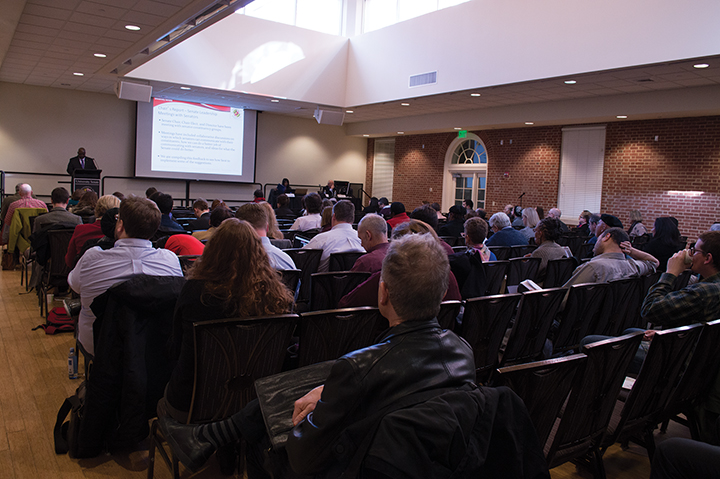The University of Maryland Senate announced its executive committee candidates Wednesday, alongside nominees for other committees and councils.
The Nominations Committee published the slate running and their statements for open positions in the Senate Executive Committee — including the senate chair position — the Committee on Committees, the University Athletic Council, the Council of University System Faculty and the Campus Transportation Advisory Committee. Senators will cast their votes on the nominees May 9.
The chair-elect will serve a one-year term and lead the senate’s meetings. Both candidates for the position — arts and humanities professor Kim Coles and director of animal research support Pamela Lanford — are currently senators and have also been nominated for the Senate Executive Committee.
Coles, a senator since fall 2017, wants to be chair partially due to her humanities background. She thinks she can help bring representation from a different part of the campus, as the last two chairs worked in STEM departments.
[Read more: UMD Senate approves diversity task force recommendations]
“I think we spend a lot more time talking to students, people in the humanities, professors in the humanities as a part as a function of what we do,” Coles said. “We spend a lot of time talking to students but we also spend a lot of time listening and that’s not a bad skill to bring to the position of chair.”
She believes her experiences organizing “Democracy Then and Now: Citizenship and Public Education” — an initiative focused on the “intersection of public education, American democracy and civic engagement,” which included lectures and voter registration drives — helped her become familiar with administrative offices, such as the Dean of Undergraduate Studies and the Office of the Provost. This could help with cooperation between groups, Coles said.
Lanford said her experience as a senator on the Senate Executive Committee and as a member on the Committee on Committees motivated her to run for chair. She is especially pleased with the Joint President and Senate Inclusion and Respect Task Force recommendations and plans to see them through.
The task force’s recommendations, which include the adoption of a university policy prohibiting, “threatening or intimidating acts motivated in whole or in part because of an individual or group’s actual or perceived protected status,” have been approved by university President Wallace Loh and will start to be put into place.
[Read more: UMD Senate committee unanimously rejects campuswide hate symbols ban]
“I’m a bridge builder, I’m a relationship builder, the needs of the campus change from year to year, it’s difficult to know what’s going to happen next year,” Lanford said. “We have to build relationships.”
There are 27 people total running — 15 of whom are faculty senators — for 13 spots on the executive committee.
Senator Jo Zimmerman, a kinesiology lecturer, is running to be on the committee to better connect the public health school and foster cooperation, such as how the bioengineering building hosts animals used in animal science classes’ research.
“This committee sounded interesting because it kind of assists and monitors all the other committees, so it gives me the best opportunity to learn about the rest of the things that I haven’t seen yet,” said Zimmerman, who also served for three years on the Staff Affairs Committee and two years on the Staff Awards Subcommittee.
Additional nominees can also be tacked onto the candidate list at the May 9 meeting. Joshua Stanley, a current undergraduate student senator who was elected this way, noted the importance of student involvement on the executive committee.
“I’ve seen what happens when you get undergraduate senator on the executive committee that doesn’t say anything or doesn’t show up,” Stanley said. “It really is a loss for the undergraduate community. You can have the confidence that I will go ahead and perform and actually deliver results.”



